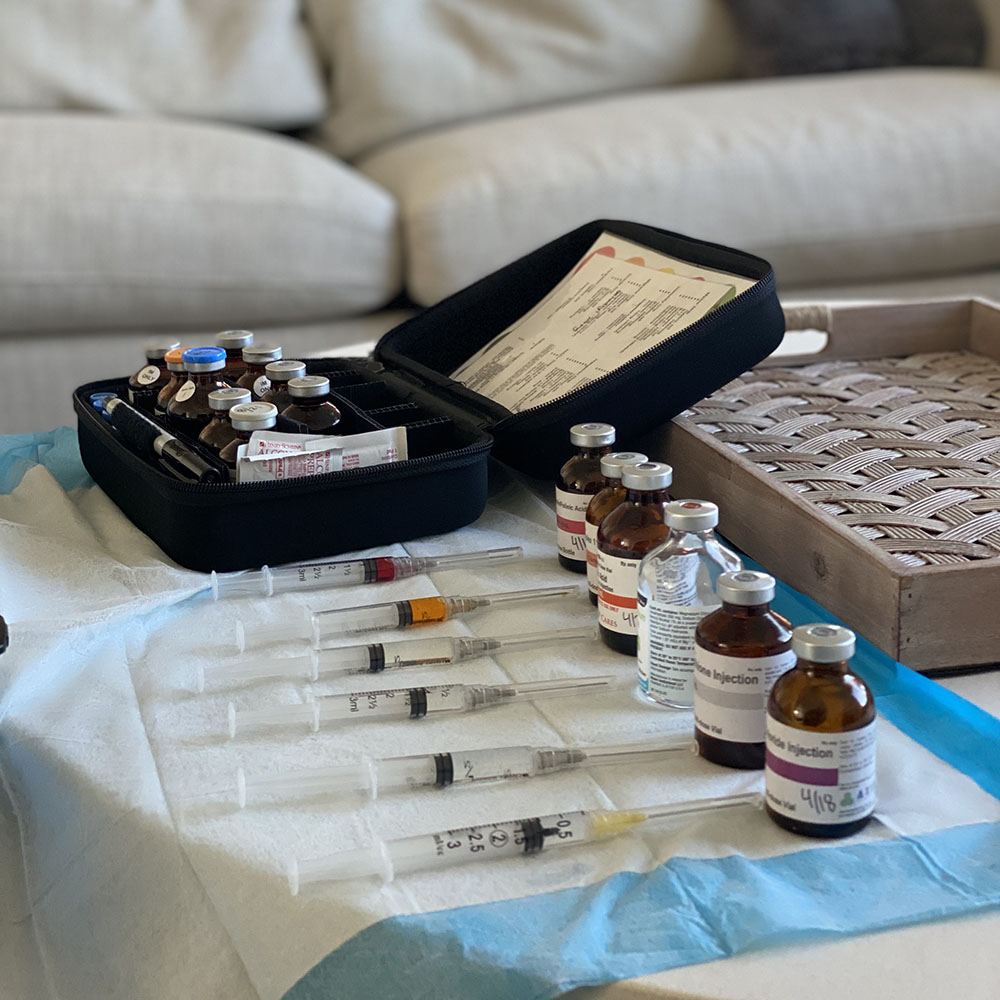Weight loss is a goal pursued by millions of individuals worldwide, driven by the desire to achieve a healthier lifestyle and improve self-confidence. However, the journey towards shedding excess pounds can be challenging, with numerous obstacles along the way. From restrictive diets to strenuous exercise routines, many struggle to find an effective and sustainable solution.
In recent years, methionine injection and methionine IV therapy has emerged as a promising contender in the realm of weight loss. This innovative approach harnesses the power of methionine, an essential amino acid, to potentially accelerate fat metabolism and support the body’s natural weight loss processes. By exploring the potential benefits and mechanisms behind methionine injection, we can uncover an exciting avenue for those seeking a transformative weight loss experience.
Methionine, an essential amino acid, plays a vital role in our body’s overall functioning. As one of the building blocks of protein, it contributes to the synthesis of proteins, enzymes, and other important molecules. Methionine also participates in various metabolic processes, making it a key player in maintaining optimal health.
When it comes to protein synthesis, methionine acts as the starting point, initiating the formation of new proteins within our cells. This process is crucial for tissue repair, muscle growth, and overall development. Methionine also supports the production of important molecules like glutathione, which acts as a potent antioxidant, protecting our cells from damage.
In addition to protein synthesis, methionine plays a significant role in metabolism. It assists in the conversion of fats into energy, helping to optimize our body’s energy production and utilization. By promoting efficient fat metabolism, methionine may contribute to weight management and potentially aid in weight loss efforts.
While methionine is essential for our body’s functioning, it is not produced naturally. Therefore, it is important to obtain methionine through our diet. Foods rich in methionine include lean meats, fish, eggs, dairy products, nuts, and seeds. By incorporating these dietary sources into our meals, we can ensure an adequate intake of methionine and support our overall health and well-being.

The relationship between methionine and weight loss has garnered attention due to the potential impact of this essential amino acid on fat metabolism and energy production. Several studies and research findings suggest that methionine may offer benefits for individuals looking to achieve their weight loss goals.
One of the key roles of methionine in weight loss is its involvement in fat metabolism. Methionine helps facilitate the breakdown of fats in the liver and aids in the transportation of fats to other tissues for energy utilization. This process, known as lipolysis, is crucial for mobilizing stored fat and converting it into usable energy. By enhancing fat metabolism, methionine may contribute to the reduction of adipose tissue and overall weight loss.
Moreover, methionine plays a significant role in energy production. As an essential component in the production of adenosine triphosphate (ATP), the body’s main energy currency, methionine supports cellular energy production. By optimizing energy levels, methionine may increase physical stamina and endurance, facilitating more vigorous exercise and potentially aiding weight loss efforts.
Research studies have shed light on the potential benefits of methionine for weight loss. For instance, a study published in the Journal of Nutritional Science and Vitaminology found that methionine supplementation contributed to a decrease in body weight and fat accumulation in mice fed a high-fat diet. Additionally, a study in the journal Obesity Surgery reported that patients who received methionine injections as part of their weight loss treatment experienced a greater reduction in body weight compared to those who did not receive the injections.
While these findings are promising, it’s important to note that methionine alone is not a magic solution for weight loss. It should be approached as part of a comprehensive and balanced weight loss strategy that includes proper nutrition, regular physical activity, and lifestyle modifications. Consulting with healthcare professionals and registered dietitians is crucial to ensure personalized guidance and optimize the potential benefits of methionine for weight loss.

Methionine injections offer a targeted and direct method of delivering this essential amino acid to the body, potentially enhancing its weight loss benefits. Understanding how methionine injections work and their unique characteristics compared to oral intake is key to appreciating their potential efficacy.
When methionine is administered through injections, it bypasses the digestive system and is directly absorbed into the bloodstream. This allows for rapid delivery and efficient utilization by the body. Unlike oral intake, which involves the breakdown and absorption of methionine through the gastrointestinal tract, injections provide a more direct route of administration.
The bioavailability of methionine through injections or IV therapy is also noteworthy. By circumventing the digestive process, methionine injections provide a higher concentration of the amino acid to be utilized by the body. This increased bioavailability ensures that a greater proportion of the injected methionine reaches target tissues and can actively participate in fat metabolism and energy production.
In contrast, oral intake of methionine requires digestion, absorption through the intestines, and subsequent metabolism in the liver before it reaches the systemic circulation. This process may result in some methionine being broken down or excreted before it can exert its weight loss effects. The direct delivery of methionine through injections may provide a more potent and efficient means of achieving the desired outcomes.
Comparing the benefits of methionine injections to oral intake for weight loss reveals potential advantages. Methionine injections allow for precise dosing, ensuring a consistent and optimal intake of the amino acid. This accuracy is particularly beneficial when targeting specific areas of the body or when a higher dosage is required. Moreover, the direct absorption of methionine through injections may result in faster and more noticeable weight loss effects compared to oral supplementation.
While methionine injections offer unique advantages, it’s important to emphasize that they should be administered under the guidance of healthcare professionals. Consulting with a healthcare provider can help determine the appropriate dosage, monitor potential side effects, and ensure the injections are integrated into a comprehensive weight loss plan for optimal results.
Methionine injections, through intramuscular shot, or IV therapy, have been studied for their potential appetite-suppressing effects, making them a compelling option for individuals seeking to manage their food intake and support weight loss goals. Understanding the impact of methionine on hunger hormones and satiety signals provides valuable insights into how these injections may help control cravings and promote feelings of fullness.
Research suggests that methionine may influence hunger hormones, such as leptin and ghrelin, which play a crucial role in regulating appetite. Leptin, often referred to as the “satiety hormone,” helps signal to the brain that we are full and have had enough to eat. Ghrelin, on the other hand, is known as the “hunger hormone” and stimulates appetite.
Methionine injections have shown potential in modulating these hunger hormones. Studies have indicated that methionine may increase leptin levels, promoting a sense of fullness and reducing the desire to eat. By enhancing leptin signaling, methionine injections may help individuals feel satisfied with smaller portions and have better control over their calorie intake.
Additionally, methionine injections may influence ghrelin levels, thereby reducing hunger sensations. While further research is needed to fully elucidate this mechanism, initial findings suggest that methionine injections may potentially suppress ghrelin production or alter its activity, resulting in reduced appetite and decreased food cravings.
By affecting hunger hormones and satiety signals, methionine injections offer the potential to support appetite suppression and create a caloric deficit necessary for weight loss. However, it is important to note that appetite regulation is complex and multifactorial. Methionine injections should be used in conjunction with a balanced diet, regular physical activity, and lifestyle modifications to achieve sustainable weight loss results.
As with any medical intervention, it is crucial to consult with healthcare professionals before considering methionine injections for appetite suppression. They can provide personalized advice, evaluate individual health conditions, and guide patients in integrating methionine injections into a comprehensive weight loss plan.

When considering weight loss options, it is essential to compare methionine injections and IV therapy with traditional weight loss methods to make an informed decision. Understanding the advantages and disadvantages of methionine injections and considering personalized factors can help individuals determine whether they are a suitable choice for their weight loss journey.
Comparing methionine injections with traditional weight loss methods reveals several distinguishing factors. One advantage of methionine injections is their potential to target multiple aspects of weight loss simultaneously. Methionine injections have been associated with fat metabolism, energy production, appetite suppression, lipolysis, and potential enhancements in exercise performance. This multifaceted approach sets them apart from certain traditional weight loss methods that may focus on only one or two aspects.
Moreover, methionine injections offer a non-invasive alternative to surgical interventions such as bariatric surgery or invasive procedures like liposuction. For individuals seeking non-surgical weight loss options, methionine injections can be an attractive choice.
However, it is important to acknowledge the limitations and potential disadvantages of methionine injections as well. While research suggests potential benefits, the evidence base for methionine injections as a standalone weight loss method may not be as extensive as that for more established approaches like diet and exercise modifications. Additionally, methionine injections should be used in conjunction with a comprehensive weight loss plan that includes a balanced diet and regular exercise to maximize results.
Personalized considerations play a crucial role in choosing methionine injections as a weight loss option. Consulting with healthcare professionals is essential to evaluate individual health conditions, potential contraindications, and any specific goals or preferences. Factors such as overall health, medical history, lifestyle, and personal preferences should be taken into account when deciding whether methionine injections align with an individual’s weight loss needs.
Furthermore, cost and accessibility are practical considerations when comparing methionine injections with other weight loss methods. It is important to assess the financial implications and availability of methionine injections in an individual’s location, as these factors can vary.
In conclusion, comparing methionine injections with traditional weight loss methods provides valuable insights for individuals seeking effective weight loss options. Understanding the advantages, disadvantages, and personalized considerations can help individuals make an informed choice that aligns with their goals and circumstances. Consulting with healthcare professionals remains crucial to receive personalized advice and guidance throughout the weight loss journey.
Methionine injections, when administered under proper medical supervision, are generally considered safe. However, like any medical procedure, they may carry some risks and side effects. It is important to consult with a healthcare professional to assess your individual health condition and determine the suitability of methionine injections for weight loss.
Methionine injections are believed to work by enhancing fat metabolism, stimulating lipolysis (the breakdown of fats), suppressing appetite, and potentially increasing energy levels. These mechanisms, in combination with a balanced diet and regular exercise, may contribute to weight loss.
Methionine injections are often used as part of a comprehensive weight loss plan that includes dietary modifications and exercise. While they can provide support and potential benefits for weight loss, they are typically not recommended as a standalone method. Consulting with healthcare professionals can help determine the most effective approach for your weight loss goals.
The timing of results may vary among individuals. Some people may start noticing changes in weight and body composition within a few weeks of starting methionine injections, while others may require more time. It is important to remember that consistency in following a healthy lifestyle, including diet and exercise, is key to achieving sustainable results.
Methionine injections may aid in targeting stubborn fat areas. While results can vary, some individuals have reported a reduction in fat deposits in specific problem areas. However, it is important to remember that spot reduction is not guaranteed, and overall weight loss and body composition improvements are the primary goals.
While there are no specific dietary restrictions associated with methionine injections, it is generally advisable to follow a balanced and nutritious diet to support overall health and weight loss efforts. Your healthcare professional can provide guidance on dietary recommendations tailored to your specific needs.
Methionine injections may not be suitable for everyone. Individuals with certain medical conditions, such as kidney disease or a history of allergies, may have contraindications or require special precautions. It is important to consult with a healthcare professional to determine if methionine injections are appropriate for you.
While methionine injections may offer some benefits for weight loss, incorporating regular exercise into your routine is highly recommended for optimal results. Exercise not only supports weight loss but also contributes to overall health, muscle tone, and improved metabolism.